Ahmed, Bayes, Md. Kamruzzaman, Xuan Zhu, Md. Shahinoor Rahman, and Keechoo Choi. "Simulating Land Cover Changes and Their Impacts on Land Surface Temperature in Dhaka, Bangladesh". Remote Sensing. November 15, 2015. https://www.mdpi.com/... (Contributed by Gregory Autin).
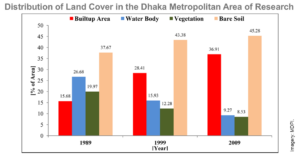 Despite research that has been conducted elsewhere, little is known, to-date, about land cover dynamics and their impacts on land surface temperature (LST) in fast growing mega cities of developing countries. Landsat satellite images of 1989, 1999, and 2009 of Dhaka Metropolitan (DMP) area were used for analysis. The study first identified patterns of land cover changes between the periods and investigated their impacts on LST; second, applied artificial neural network to simulate land cover changes for 2019 and 2029; and finally, estimated their impacts on LST in respective periods. Simulation shows that if the current trend continues, 56% and 87% of the DMP area will likely to experience temperatures in the range of greater than or equal to 30 °C in 2019 and 2029, respectively.
Despite research that has been conducted elsewhere, little is known, to-date, about land cover dynamics and their impacts on land surface temperature (LST) in fast growing mega cities of developing countries. Landsat satellite images of 1989, 1999, and 2009 of Dhaka Metropolitan (DMP) area were used for analysis. The study first identified patterns of land cover changes between the periods and investigated their impacts on LST; second, applied artificial neural network to simulate land cover changes for 2019 and 2029; and finally, estimated their impacts on LST in respective periods. Simulation shows that if the current trend continues, 56% and 87% of the DMP area will likely to experience temperatures in the range of greater than or equal to 30 °C in 2019 and 2029, respectively.
Posted on 16/12/24
Recent Abstracts
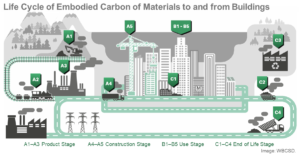
Decarbonizing Construction – Guidance for Investors and Developers to Reduce Embodied Carbon
A large part of the construction sector’s emissions come from building products and materials – embodied carbon. Embodied carbon has become the focus of regulatory bodies, making it a risk factor for developers and investors to price into construction projects. This report is for developers and investors, who drive t ...
Posted on 09/02/22
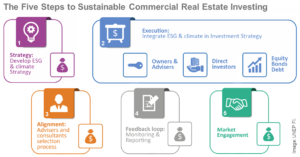
Climate Risk & Commercial Property Values: A Review and Analysis of the Literature
This is a forward-looking climate risk analysis and assessment of the impact of climate risk on commercial property investments through pricing, CapEx or OpEx decisions. The study sought to understand the extent to which real estate markets price in the risks from extreme weather and climate change and the channels th ...
Posted on 07/02/22
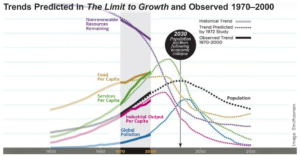
The Real Message of 𝘛𝘩𝘦 𝘓𝘪𝘮𝘪𝘵𝘴 𝘵𝘰 𝘎𝘳𝘰𝘸𝘵𝘩 – A Plea for Forward-Looking Global Policy
The Limits to Growth (LtG) published in April 1972, called for managing the reduction of resources used in economic development. It warned that overshoot will be caused by significant institutional delays in decision-making and showed how the equilibrium between remedial action and ecosystem improvement could be achie ...
Posted on 05/02/22
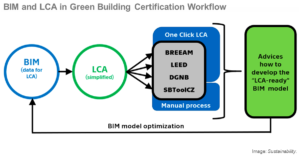
Building Information Modeling for Environmental Impact Assessment in Early Design Phases: A Literature Review
Building information modeling (BIM) and building energy modeling (BEM) are two key tools for transitioning to net-zero energy buildings (NZEBs). This review discusses the connection between BIM, BEM and life-cycle assessment (LCA) and their role in the development and operation of net-zero carbon (NZC) buildings. It ...
Posted on 04/02/22
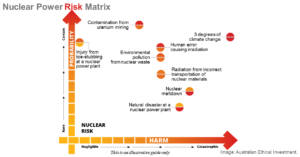
Potential Liability of Governments for Failure to Prepare for Climate Change
This paper examines the potential legal liability of governments by accumulating risks of climate change. It addresses negligence, fraud, and takings, describing the benefits and challenges of each, and explores ways to overcome a government’s claim of sovereign immunity in the context of a negligence claim. It descr ...
Posted on 03/02/22
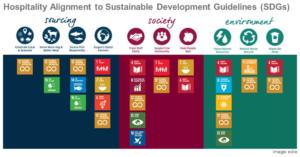
High Performance Hospitality
The cases describe the environmental, social and financial advantages and applications of hotel design, construction, and operations to assist in expanding a high-performance development resources network. They are grouped by category – mid-rate, conference center, and luxury – and cover the resource for the project d ...
Posted on 02/02/22
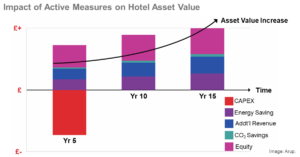
Exploring Green Hotel Competitive Strategies by Using the Hybrid Method for Complex Data Analysis
Green hotels emphasize safety, health, and environmental friendliness. They promote green operations, green consumption, environmental protection, and the reasonable consumption of resources in operations. This study explored the criteria and competitive strategies of green hotels in the development of criteria syste ...
Posted on 31/01/22
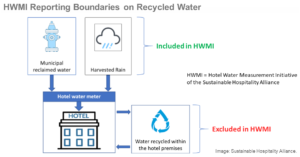
Sustainable Hospitality Alliance
The Sustainable Hospitality Alliance drives collaborative action. It is an alliance of senior executives from hospitality companies and industry partners who collaborate and cooperate on joint areas of action. The alliance develops open resources and programs to enable the wider industry to grow sustainably and opera ...
Posted on 29/01/22
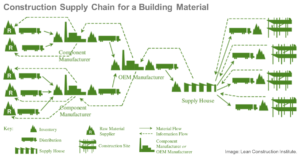
Defining Supply Chain Visibility for Industrial Construction Projects
Visibility is needed in the construction supply chain for sustainable procurement and decision-making. Supply chain visibility (SCV) is essential for on-time delivery and installation of materials and results in more effective supply chain management and improved project ESG performance. For effective communication w ...
Posted on 27/01/22

Together, Let’s Help Restore Our Earth
Accor advocates sustainable development and hospitality that respects the environment and communities in which the group operates. Chiefly through its “Planet 21” program built around employees, customers, partners, communities, food, and buildings, it limits its negative social and environmental impacts. Accor's “Pl ...
Posted on 20/01/22
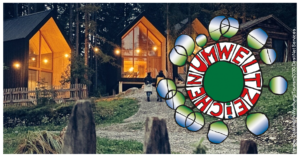
Ecolabeled Travel Offerings
Tourism 2030 DestiNet Services reports that there are over 200 certification programs on sustainable tourism – certificates operating worldwide, certificates in Europe (in two or more European countries), and national certificates. The Austrian ecolabel for "Green Meetings and Green Events" is said to be the first gree ...
Posted on 19/01/22
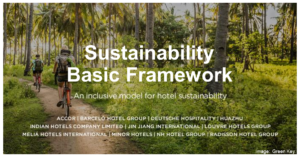
Top Players in the Hotel Industry Build Inclusive Sustainability Framework Accessible for All Hotels
Green Key is launching an initiative to drive responsible travel and tourism. Under a common framework and definition of "hotel sustainability", it aims to raise the basic level of sustainability in hospitality for all travelers and stakeholders and guide the industry towards sustainable change. In consultation with i ...
Posted on 19/01/22
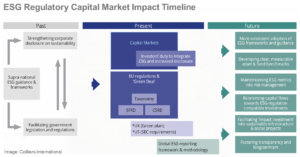
ESG: At a Tipping Point
The regulation of environmental, social and governance (ESG) factors in investment and corporate decision-making in capital markets has reached a tipping point. The new regulations create a standard for ESG reporting to facilitate sustainable investments. However, the drive to advance ESG-compliant investing is also ...
Posted on 17/01/22
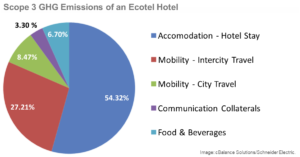
Technical Guidance for Calculating Scope 3 Emissions
GHG Protocol Scope 1 includes emissions from the combustion of fuels by sources owned or controlled by the reporting company. Scope 2 comprises emissions from combusted fuels to generate electricity, steam, heating and cooling purchased and consumed by a company. Scope 3 encompasses all other indirect emissions in a ...
Posted on 16/01/22
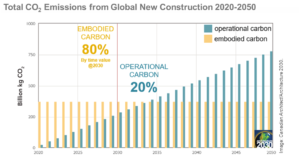
Growth in Floor Area: The Blind Spot in Cutting Carbon
The construction sector has focused mainly on improving its energy efficiency and the substitution of fossil fuels to decarbonize buildings. It has largely ignored the threat from the continued growth in the built environment. This article argues that embodied carbon in buildings can be reduced only at the strategic ...
Posted on 15/01/22

